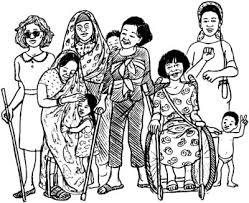Women with disabilities across Africa have called for the strengthening of institutional mechanisms to include disability component in all government’s policies, legislations, activities and programmes.
The women identified that the lack of disability inclusion at all levels has really affected WWDs in all responses of government during the COVID-19 pandemic.
The women disclosed this during a webinar organized by the Urgent Action Fund, Africa with the theme “The intersection between disability rights and the Covid-19 Pandemic”.
One of the panelists from Nigeria, Ekaete Judith Umoh, Executive Director of the Family Centered Initiative for Challenged Persons explained that “Disability-inclusion is grossly lacking in all COVID-19 intervention programs in Nigeria except for distribution of palliatives, which further reiterated that we are being treated with the charity model of disability.”
She stressed that PWDs are not included in the communication strategies regarding COVID-19 except for the daily press briefing.
Explaining one of the challenges WWDs are facing during the pandemic, Umoh said, “it is very difficult for WWDs to adhere to social distancing especially for those who have to depend on others and there is fear about the status of care givers and the disabled persons which makes the issue more complicated.”
She however noted that despite the huge gap, there are opportunities that can be leveraged to promote the interest of PWDs.
“Although there are huge disability gaps in the COVIID-19 interventions, however the opportunities abound. There could be collaborations with women’s movement on few interventions, collaborations with relevant MDAs, relevant CSOs on research/ survey.
“Review social protection policy to incorporate the disability component,” she added.
Agness Chindimba, Deaf Women Included from Zimbabwe highlighted how women and children with disabilities have experience decline in accessing certain health facilities in Zimbabwe as a result of the pandemic, lockdown and not prioritizing the needs of WWDs.
The other panelists, Razafinjato Fela Mijoro, Association des Femmes Handicapées in Madagascar and Mushimiyimana Gaudence, Rwandan Organisation of Women with Disabilities (Rwanda) also highlighted the various challenges WWDs have been going through in their respective countries and the efforts they have been taking as Disabled Peoples’ Organozations.
Earlier while giving the opening remarks, the host, Tariro Tandi, Head, Partnerships & Development, UAF Africa, explained that the objective of the webinar is “to understand and document recommendations on the support required by women and gender non conforming women with disabilities as they deal with COVID-19 and its effects and what would be imperative in their efforts to rebuild their lives.”

